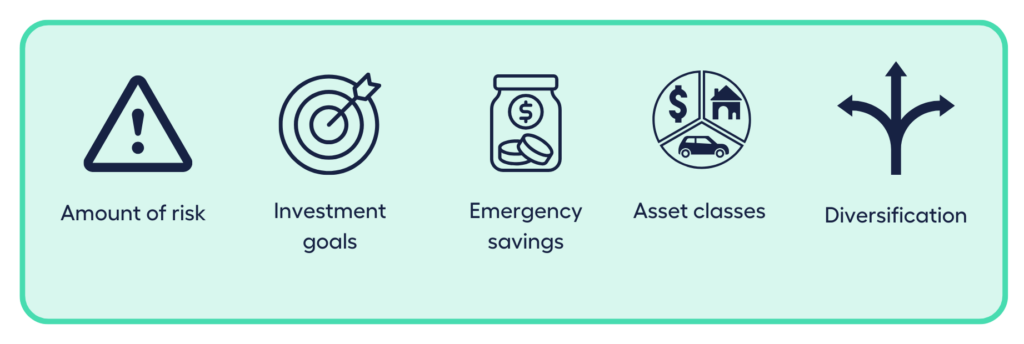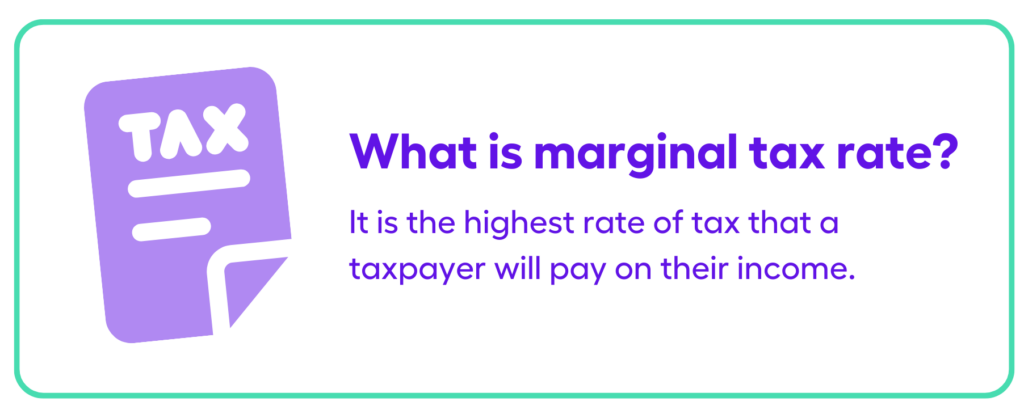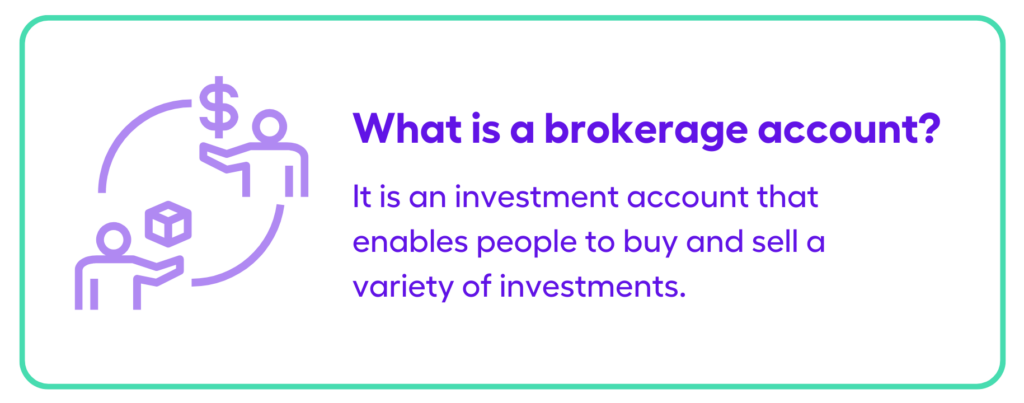It’s exciting to start an investment journey to safeguard your financial future, but investment planning is essential. For example, just as you wouldn’t set out on a road trip without a map or bake a cake without a recipe, investing blindly can result in potential risks. Your financial compass, or investment plan, will lead you on this journey.

In the upcoming sections of this article, we’ll explore the layers of investment planning, uncovering why it’s essential for a prosperous financial future. Whether you’re a novice investor or aiming to refine your strategy, the insights ahead will shed light on why planning isn’t just preliminary—it’s the foundation of a resilient investing journey.
Jump straight to…
Why You Should Have an Investment Plan Before Investing
It is very important to have an investment plan before you begin investing for a number of reasons. Think of it as a financial road map that outlines clear objectives and directions based on your desired lifestyle, level of risk tolerance, and time horizon for investments.
Without a strategy, you might lose focus of your priorities and goals, which can lead you to make snap judgements rather than deliberate decisions. Having a plan prevents you from making rash decisions and keeps you on course even in unpredictable market conditions. In this way, you can keep your long-term objectives in mind and avoid letting short-term ups and downs affect you.
Investment Planning and Financial Goals
Achieving financial freedom and security depends heavily on investment planning and financial goals. It is important to consider the following.

Setting Financial Goals
Choosing what you want to achieve with your money is the first step in investment planning. It might involve things like funding your children’s education, purchasing a home, or saving for retirement.
Consider as well that your investment plan meets your liquidity requirements without compromising on your long-term goals. Clear and realistic goals give your investment efforts a purpose and aid in concentrating on the best strategies to make them a reality.
Understanding Your Risk
How much risk are you willing to take when investing? This depends on factors like your age, current financial situation, and length of investment time. Identifying your risk tolerance enables you to choose investments that align with your tolerance level and prevent you from taking unwarranted risks or losing sleep due to worry over investment fluctuations.
Choosing the Right Investments
You can choose investments that fit your needs once you are clear on your objectives and your risk tolerance. Some, like savings accounts or government bonds, are safer for short-term goals. Others, like shares or real estate, may carry greater risk but could offer greater long-term rewards.
Checking on Your Investments
It’s critical to monitor the performance of your investments regularly. You can make sure they’re acting as you expect by checking on them frequently. If not, you can make adjustments. By doing this, you can make wise decisions based on how your investments are performing and stay on track to accomplish your goals.
Know What You Need Before Investing
Knowing what you need before investing is crucial because it facilitates informed decision-making and lowers the likelihood of losing money.
Amount of risk
It’s critical to assess your level of comfort with risk before entering the world of investments. The act of investing naturally includes the risk of potentially losing some or all of the money you set aside. Furthermore, the returns on these investments might differ from what you thought you’d get. If you feel uneasy about the risks involved in certain investments, you might be better off pursuing less risky alternatives.
Investment goals
It is crucial to express your financial goals, level of risk tolerance, and time horizon for investments in detail. These elements form the basis for finding investments that are customised to your particular needs, hastening the process of achieving your financial goals.
Emergency savings
Having a sizable emergency fund with enough money in it to cover several months’ worth of unexpected expenses is important. By doing this, you’ll create a safety net that won’t force you to quickly sell investments or sacrifice savings in the event of an emergency financial situation.
Asset classes
There are different asset classes as you go along. This journey will show you how to find investments that fit your current financial situation, risk tolerance, and time horizon, ultimately bringing you one step closer to your financial goals.
Diversification
By spreading your money among and within different asset classes, you can create a harmonious symphony that will reduce risk in your overall portfolio.

Save on Taxes and Fees
In order to maximise returns, reduce risk, improve cash flow, and take advantage of tax benefits, taxes and fees must be effectively managed during the investment planning process. Consider using the following strategies to manage taxes and fees in investment planning more effectively:
Understand how investment income is taxed.
In order to make wise decisions, you should be aware of how much tax you will pay on earnings (income and capital gains) from the investment. Investment income is taxed at your marginal tax rate. Investment income includes:
- Interest you earn
- Dividends from stocks
- Rent from properties
- Profits shared from managed funds
- Gains from selling property, shares or cryptocurrencies

Take advantage of tax deductions.
You could qualify for tax deductions when purchasing, handling, and selling investments. Remember, there are regulations about what expenses you can and cannot claim as deductions.
Consider property investment tax deductions.
You may be able to claim tax deductions for money invested in real estate. You can deduct the cost of hiring a property agent to manage your investment property from your taxes, for instance.
Explore tax-effective investment options.
Companies may offer investment options aimed at reducing your tax liability. Consider consulting a financial advisor or reviewing the information provided by financial institutions to explore ways to reduce your taxes.
Maximise superannuation contributions.
By making contributions to your superannuation, you may be able to receive potential tax advantages that will help you improve your current financial situation.
Understand & Stay Within Your Risk Tolerance
Risk tolerance reflects how comfortable you are when facing financial risks. It’s a psychological aspect influenced by personality and life experiences, and it can change over time.
It’s critical to match your investment decisions to your risk tolerance when planning your overall portfolio. This avoids making rash decisions or worrying excessively when the market is down. Here are some methods to keep your risk tolerance in check.
You can choose investments that match your financial goals and level of comfort with risk by understanding your personal risk profile, using risk assessment tools, diversifying your portfolio, regularly monitoring your portfolio, and getting advice from a financial expert.
Ensure You Won’t Forget Financial Protection
Securing financial protection is essential when planning investments. Here are other reasons why financial protection should be part of the planning process:

Risk Management
Financial security is an important tool for managing risks. It serves as a safeguard against possible losses if the value of a particular investment declines. Additionally, you can spread the risk and lessen the effects of poor performance in a single investment or category by diversifying your investments, resulting in a portfolio-wide impact that is less abrupt.
Long-Term Protection
Choosing long-term investments provides protection from the effects of inflation risk. Money loses value over time as a result of inflation. However, investing gives you the chance to generate income and returns that outpace inflation, protecting the purchasing power of your money.
Financial Goals
Having financial protection can expedite the achievement of your financial goals. By creating a well-structured plan and regularly checking your investments, you can ensure that they are in line with your goals and continue to perform as expected. This helps you stay on track and allows you to make timely adjustments to your investment strategy.
Peace of Mind
Establishing financial protection provides a reassuring barrier against possible financial concerns brought on by insufficient financial planning. This assurance results in a sense of security and peace of mind. You gain the self-assurance needed to make investment decisions and navigate market changes with ease while also enjoying greater peace of mind.
Finding the Right Investment Options
Your investments need to be in line with your financial goals, preferred investment time horizon and level of risk tolerance.
Discover the investment categories that most closely match your financial goals by gaining insight into the available investment options. This will help you move closer to your financial goals.
Types of Investments
You can invest your money in a variety of ways. Looking into these choices and doing some research can help you understand how to grow your portfolio. It’s worth exploring each option to see what might be best for you.
However, it’s critical to understand that all investments carry some level of risk. Be sure to consider your own risk appetite and financial objectives before making any investment decisions. Consider seeking advice from a financial advisor for individualised guidance based on your current financial situation.
Defensive investments
Defensive investments (aka low-risk investments) that intended to produce income and protect the invested capital as lower-risk alternatives. They are frequently used to diversify a portfolio or achieve short-term goals.
Fixed interest
An investor who makes a fixed-interest investment lends money to a company or government. The investor receives a predetermined interest rate in return for a predetermined time period. The designated term is over when the initial sum is returned on the maturity date. These investments are also known as bonds or fixed-income investments.
Government and corporate bonds
Due to their fixed rate of return, both government and corporate bonds are typically regarded as reasonably safe investment options, however, you can be exposed to interest rate risk or credit risk (if the issuer defaults).
Savings accounts and term deposits
Term deposits and savings accounts are the two most common types of savings products available in Australia. The Australian Government Financial Claims Scheme upholds the security of both term deposits and savings accounts.
Growth Investments
Growth investments are those that are anticipated to grow faster than the market as a whole. Compared to defensive investments, these are higher-risk investments but also have the potential for higher returns. These investments are frequently chosen in order to achieve superior returns and accomplish long-term goals.
Local shares
Australian local shares are stocks of businesses that are listed on the ASX, or Australian Stock Exchange. Both domestic and foreign investors may purchase these shares in the market, which are traded on the ASX platform.
Global shares
This refers to business stocks that are listed on stock exchanges outside of Australia. These shares give investors the opportunity to diversify their investment portfolios and gain access to businesses and industries that might not be well-represented in the Australian market or diversify geographically.
Property
Investments in real estate are made with the intention of generating income or achieving capital growth. Various property types, including residential, commercial, and industrial ones, are included in these investments.
Managed Funds and Exchange Traded Funds (ETFs)
Managed funds (or mutual funds in the US) refers to investment vehicles whereby individual investors pool their funds to build a diversified portfolio of assets, such as stocks, bonds, real estate, or cash. Competent fund managers are in charge of overseeing these funds and choose investments on behalf of the investors.
P2P Lending
Peer-to-peer (P2P) lending is a lending technique that uses an online platform to link borrowers and investors.
Superannuation
Employers must contribute a minimum amount to their employees’ super accounts under the superannuation system, which is a lawful retirement savings programme. When a person reaches retirement age, they can access these funds, which are then invested by superannuation funds across a variety of options.
Gold
Investing in gold is a popular strategy used to diversify investment portfolios and protect against inflation and economic unpredictability. Physical gold, gold-backed exchange-traded funds, gold stocks, and self-managed super funds are a few ways to invest in gold.
How a Beginner Should Start Investing
It’s crucial to organise your finances and conduct research before you start investing. Here are some ideas to kick-start your investment journey:

Set your investment goals.
Establish your investment objectives, whether they are to generate income, build wealth, achieve long-term goals, reach short-term goals, or save for a particular purpose. This makes sure that you are investing your money in ways that are consistent with your financial goals, whether they are to accumulate wealth, hit milestones, or meet particular financial needs.
Understand your risk tolerance.
Consider your comfort level with value fluctuations and how much risk you can tolerate. If you invest beyond your comfort level, you might panic during downturns and make poor decisions, potentially jeopardising your long-term financial goals.
On the other hand, if you’re too risk-averse, you might miss out on higher returns that align with your objectives. By accurately assessing your risk tolerance, you can create a portfolio that balances potential rewards with your ability to handle market volatility, leading to a more successful and stress-free investment journey.
Choose an investing strategy.
Select an investment strategy that aligns with your financial goals and level of risk tolerance. This includes possibly investing in the share market, property, fixed income, or a combination of different options.
The right investment strategy for you must be chosen in order to ensure that your financial resources are used in a way that maximises your potential for returns while minimising the risk of losses that could jeopardise your objectives.
Determine how much money you need to invest.
Consider your budget and how much you’ll need to reach your financial goals. Your budget outlines how much more money you can set aside for investments without jeopardising your ability to pay your bills on time and maintain your financial stability.
You can set realistic goals, choose appropriate assets to invest in, and determine when to accomplish your goals by having a clear understanding of the funds that are available for investment. By doing so, you can avoid overcommitting or underinvesting and make sure that your investment strategy is consistent with your overall current financial situation and desired goals while having enough money for your needs.
Open a brokerage account.
Choose a brokerage account that meets your needs, and make sure to compare the costs and services offered by different providers.

Research your investment options.
Do some research on the investment you want to make and consider the potential benefits and risks of each choice. When you thoroughly research your investment options, you can decide based on a thorough understanding of the potential benefits and risks of different investment options.
Start small.
Consider starting small and gradually increasing your investments if you are not 100 per cent confident or comfortable with the process of financial planning. You can learn about the investment process, market dynamics, and asset performance by starting with smaller investments without taking on too much risk.
Monitor your investments.
Keep up with your investments, and regularly review your portfolio to ensure that it still reflects your objectives and level of comfort with risk. Your initial decisions may need to be modified to maintain the benefits they provide as your life circumstances and market conditions change.
By being proactive and making the necessary adjustments, you can maximise the performance of your portfolio, reduce potential risks, and seize new opportunities, increasing the likelihood that you will meet your long-term financial goals while reducing unwarranted surprises or unexpected expenses.
Conclusion
Starting an investment planning journey can be both thrilling and overwhelming. The financial industry presents a wide range of options and opportunities, but it’s critical to move forward with caution and an informed strategy.
Knowledge is your most valuable asset in the constantly changing world of investments. At My Money Sorted, our financial advisors are here to help you through the process, ensuring that you make wise financial decisions and lay the groundwork for a prosperous financial future.
Are you prepared to start your path to prosperity and financial security? To book your first free appointment, get in touch with us by phone or through our convenient online booking system. Our team is eager to help you navigate the world of investing and make decisions that are in line with your financial goals.
Considering Investing and Need Some Advice? Speak with a Money Buddy About the Best Financial Advice to Start Investing Sooner






